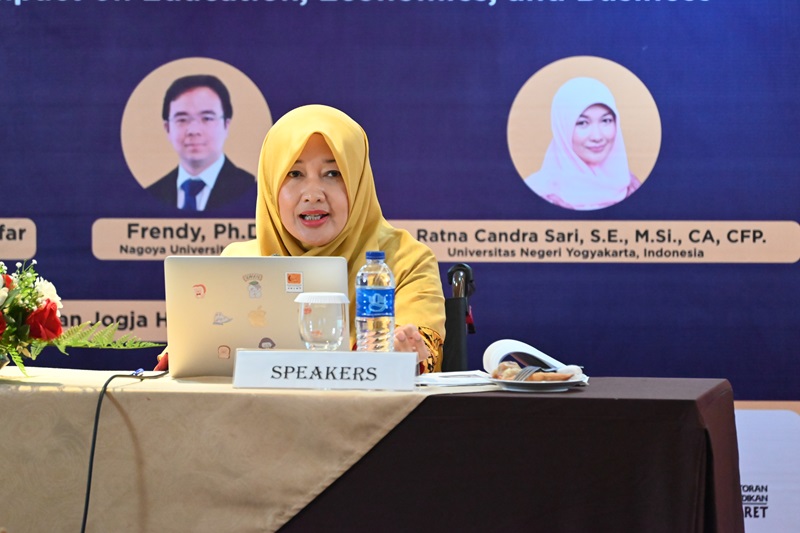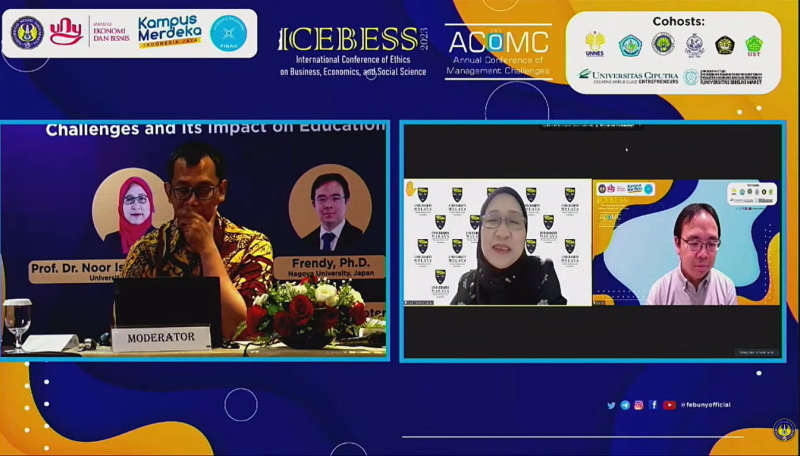You are here
ICEBESS & ACoMC 2023: Potential and Ethical Issues of The Use of AI

More than 300 participants attended the international seminar entitled International Conference on Ethics of Business, Economics, and Social Science (ICEBESS) 2023 which coincides with the Annual Conference on Management Challenges (ACoMC) 2023. As the speakers are, a lecturer of the Accounting Education Department Dr. Ratna Candra Sari, M.Si., CA, CFP., a lecturer of Universiti Malaya Malaysia Prof. Dr. Noor Ismawati Binti Jaafar, and a lecturer of Nagoya University, Japan, Frendy, Ph.D. The seminar was attended by the lecturers, students, and the representative of UNY officials. This annual seminar was opened by the Rector of UNY Prof. Dr. Sumaryanto, M.Kes., AIFO who attended the seminar online. This seminar was held in collaboration with several co-hosts., Iin the opening speech, Sumaryanto greeted the audience. “Artificial Intelligence provides opportunity and potential to improve the quality of education, economy, and business. We must be able to provide solutions with the existence of AI to facilitate our lives,” he explained.
Moreover, Prof. Setyabudi Indartono who gave a speech representing The Dean of FEB UNY stated that the seminar is aimed at providing opportunities for researchers, professionals, practitioners, and academics to share their ideas. “This seminar is expected to publish various articles that can enrich empirical findings and contribute to world civilization,” he said.
As the first presenter, Noor Ismawati stated that AI can be beneficial for economic and industrial labor. “With the advantages, AI can help in fostering decision-making by providing data analysis. AI increases the accuracy and the speed of prediction of industrial maintenance thus cutting the cost and production time. Besides, AI can be used for improving cybersecurity effectively and efficiently, and also help to find fraud quickly,” he explained.
Meanwhile, Ratna Candra Sari stated that ethics must be a thing to consider in the use of AI. Ratna raised several issues, including how AI interacts ethically with other AI, how AI interacts with human beings, and how AI interacts in society. “AI can monitor data, including humans. Besides that, the use of AI has an im pact on carbon emissions which is are bigger than humans,” she explained.
pact on carbon emissions which is are bigger than humans,” she explained.
Frendy added, AIathat canis able to interact with humans directly, generates images or text, and shows NLP (Natural Language Processing), iswhich are one of the sub-groups of AI named ‘AI Generative’. “AI Generative is trained using big data, which is basically cillwritten by various people. Based on McKinsey Global Institute data, AI contributes at least 2,6-8 trillion dollars to the global economy. The advantages of AI are extraordinary., Chat GPT can even pass the CPA test. Blake Oliver, a public accountant, argues, AI Generative can drive the productivity we always wanted, especially in the fields of auditing and taxation,” Frendy explained.
Frendy continued, in the end, as one member of professional accountants advised, it doesn’t matter how good AI is, but the humans as the users who must take an action to accept, reject, or change what has been processed by AI. (ella/tyan/fdhl)
Faculties, Graduate School, and Directorates
- Faculty of Education and Psychology
- Faculty of Engineering
- Faculty of Mathematics and Natural Sciences
- Faculty of Languages, Arts, and Cultures
- Faculty of Social Sciences, Law, and Political Science
- Faculty of Health and Sports Science
- Faculty of Vocational
- Graduate School
- Directorate of Quality Assurance
- Directorate of Researches and Community Services
Contact Us
Copyright © 2024,
